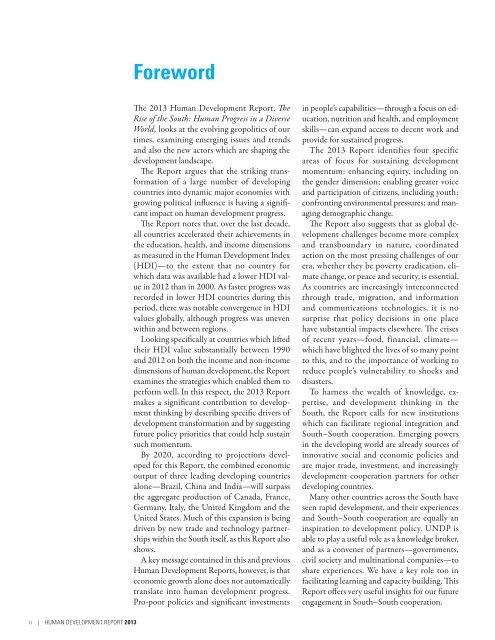E S N W
E S N W
E S N W
You also want an ePaper? Increase the reach of your titles
YUMPU automatically turns print PDFs into web optimized ePapers that Google loves.
ii | Human Development RepoRt 2013<br />
Foreword<br />
The 2013 Human Development Report, The<br />
Rise of the South: Human Progress in a Diverse<br />
World, looks at the evolving geopolitics of our<br />
times, examining emerging issues and trends<br />
and also the new actors which are shaping the<br />
development landscape.<br />
The Report argues that the striking transformation<br />
of a large number of developing<br />
countries into dynamic major economies with<br />
growing political influence is having a significant<br />
impact on human development progress.<br />
The Report notes that, over the last decade,<br />
all countries accelerated their achievements in<br />
the education, health, and income dimensions<br />
as measured in the Human Development Index<br />
(HDI)—to the extent that no country for<br />
which data was available had a lower HDI value<br />
in 2012 than in 2000. As faster progress was<br />
recorded in lower HDI countries during this<br />
period, there was notable convergence in HDI<br />
values globally, although progress was uneven<br />
within and between regions.<br />
Looking specifically at countries which lifted<br />
their HDI value substantially between 1990<br />
and 2012 on both the income and non-income<br />
dimensions of human development, the Report<br />
examines the strategies which enabled them to<br />
perform well. In this respect, the 2013 Report<br />
makes a significant contribution to development<br />
thinking by describing specific drivers of<br />
development transformation and by suggesting<br />
future policy priorities that could help sustain<br />
such momentum.<br />
By 2020, according to projections developed<br />
for this Report, the combined economic<br />
output of three leading developing countries<br />
alone—Brazil, China and India—will surpass<br />
the aggregate production of Canada, France,<br />
Germany, Italy, the United Kingdom and the<br />
United States. Much of this expansion is being<br />
driven by new trade and technology partnerships<br />
within the South itself, as this Report also<br />
shows.<br />
A key message contained in this and previous<br />
Human Development Reports, however, is that<br />
economic growth alone does not automatically<br />
translate into human development progress.<br />
Pro-poor policies and significant investments<br />
in people’s capabilities—through a focus on education,<br />
nutrition and health, and employment<br />
skills—can expand access to decent work and<br />
provide for sustained progress.<br />
The 2013 Report identifies four specific<br />
areas of focus for sustaining development<br />
momentum: enhancing equity, including on<br />
the gender dimension; enabling greater voice<br />
and participation of citizens, including youth;<br />
confronting environmental pressures; and managing<br />
demographic change.<br />
The Report also suggests that as global development<br />
challenges become more complex<br />
and transboundary in nature, coordinated<br />
action on the most pressing challenges of our<br />
era, whether they be poverty eradication, climate<br />
change, or peace and security, is essential.<br />
As countries are increasingly interconnected<br />
through trade, migration, and information<br />
and communications technologies, it is no<br />
surprise that policy decisions in one place<br />
have substantial impacts elsewhere. The crises<br />
of recent years—food, financial, climate—<br />
which have blighted the lives of so many point<br />
to this, and to the importance of working to<br />
reduce people’s vulnerability to shocks and<br />
disasters.<br />
To harness the wealth of knowledge, expertise,<br />
and development thinking in the<br />
South, the Report calls for new institutions<br />
which can facilitate regional integration and<br />
South–South cooperation. Emerging powers<br />
in the developing world are already sources of<br />
innovative social and economic policies and<br />
are major trade, investment, and increasingly<br />
development cooperation partners for other<br />
developing countries.<br />
Many other countries across the South have<br />
seen rapid development, and their experiences<br />
and South–South cooperation are equally an<br />
inspiration to development policy. UNDP is<br />
able to play a useful role as a knowledge broker,<br />
and as a convener of partners—governments,<br />
civil society and multinational companies—to<br />
share experiences. We have a key role too in<br />
facilitating learning and capacity building. This<br />
Report offers very useful insights for our future<br />
engagement in South–South cooperation.


